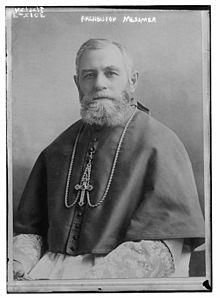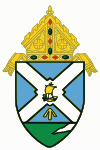Sebastian Gebhard Messmer
The Most Reverend Sebastian Gebhard Messmer | |
|---|---|
| Archbishop of Milwaukee | |
 | |
| See | Milwaukee |
| Installed | December 10, 1903 |
| Term ended | August 4, 1930 |
| Predecessor | Frederick Katzer |
| Successor | Samuel Stritch |
| Other post(s) | Bishop of Green Bay (1892–1903) |
| Orders | |
| Ordination | July 23, 1871 |
| Consecration | March 27, 1892 |
| Personal details | |
| Born | August 29, 1847 |
| Died | August 4, 1930 (aged 82) Goldach, Switzerland |
| Denomination | Catholic Church |
Sebastian Gebhard Messmer (August 29, 1847 – August 4, 1930) was a Swiss-born prelate of the Roman Catholic Church. He served as bishop of the Diocese of Green Bay (1892–1903) and Archbishop of the Archdiocese of Milwaukee (1903–1930).
Biography
Early life and education
Sebastian Messmer was born in Goldach, Switzerland, the eldest of five children of Sebastian and Rosa (née Baumgartner) Messmer.[1] His father, a farmer and innkeeper, also served in the Federal Assembly of Switzerland.[2] His mother died when he was 10 years old.[2] He received his early education in his native village, and then attended the realschule in Rorschach for three years.[3] From 1861 to 1866, he studied at the College of St. George, the diocesan preparatory seminary, in St. Gallen.[3] He studied philosophy and theology at the University of Innsbruck in Austria.[4]
Priesthood and ministry
Messmer was ordained to the priesthood by Bishop Atanasio Zuber on July 23, 1871.[5] A week later, he offered his first Mass in his native Goldach.[2] He accepted an invitation from Bishop James Roosevelt Bayley, who had visited Innsbruck to recruit missionaries for the United States, to join the Diocese of Newark in New Jersey.[1] After arriving in September 1871, he was appointed professor of theology at Seton Hall College in South Orange, where he remained until 1889.[6] In addition to his academic duties, he served as one of the secretaries of the Third Plenary Council of Baltimore (1884) and as pastor of St. Peter's Church in Newark (1885–86).[1] He received a Doctor of Canon Law degree from the Apollinare University in 1890, and was professor of canon law at the Catholic University of America in Washington, D.C., from 1890 to 1892.[6]
Bishop of Green Bay
On December 14, 1891, Messmer was appointed the fourth Bishop of Green Bay, Wisconsin, by Pope Leo XIII.[5] He received his episcopal consecration on March 27, 1892 from Bishop Otto Zardetti (who had been his schoolmate in Rorschach),[1] with Bishops Winand Wigger and John Joseph Keane serving as co-consecrators, at St. Peter's Church in Newark.[5]
During his 11-year tenure, he encouraged the growth of parochial schools and other religious institutions.[7] He also invited a Dutch priest named Abbot Bernard Pennings to establish the Norbertine Order in the United States, which led to the founding of St. Norbert College in De Pere.[7]
Archbishop of Milwaukee
On November 28, 1903, Messmer was appointed the fourth Archbishop of Milwaukee by Pope Pius X.[5] He was installed on the following December 10.[5] As Bishop of Green Bay and as Archbishop of Milwaukee, he succeeded Frederick Katzer.[8]
An opponent of Prohibition, Messmer issued a pastoral letter in 1918, declaring, "[People] fail to see the absolutely false principle underlying the movement and the sinister work of the enemies of the Catholic Church trying to profit by this opportunity of attacking her in the most sacred mystery entrusted to her."[9] In 1921, he prohibited Catholic children in Milwaukee from participating in a Fourth of July Pilgrim pageant, which he described as "exclusively a glorification of the Protestant Pilgrims," but later withdrew his objections.[6] He was also opposed to women's suffrage.[6] He denounced the labor movement as being tinged with socialism, and drew criticism from Polish Catholics after condemning the Kuryer Polski newspaper.[10]
During his 26-year tenure, Messmer oversaw the establishment of Mount Mary College and the elevation of Marquette College to Marquette University.[8] He actively supported the American Federation of Catholic Societies as well as ministries for African American and Hispanic Catholics.[8] Nearly 30 religious orders were founded and charitable institutions were doubled during his administration.[8] He founded the Catholic Herald, the official newspaper of the Archdiocese of Milwaukee, in 1922. Messmer High School in Milwaukee, was renamed in his honor in 1928.
Messmer died while vacationing in his native Goldach, at age 82.[4] At the time of his death, he was the oldest Catholic bishop in the United States.[6] He is buried in Goldach.[4]
See also
References
- ^ a b c d History of Milwaukee, City and County. Vol. II. Chicago: S.J. Clarke Publishing Company. 1922.
- ^ a b c Blied, Benjamin Joseph (1955). Three Archbishops of Milwaukee.
- ^ a b The National Cyclopaedia of American Biography. Vol. XII. New York: James T. White & Company. 1904.
- ^ a b c Wellauer-Lenius, Maralyn A. (2010). Swiss in Greater Milwaukee. Arcadia Publishing.
- ^ a b c d e Cheney, David M. "Archbishop Sebastian Gebhard Messmer". Catholic-Hierarchy.org.
- ^ a b c d e "MGR. MESSMER DIES; AMERICAN PRELATE". The New York Times. August 5, 1930.
- ^ a b "Bishops of the Diocese of Green Bay". Roman Catholic Diocese of Green Bay.
- ^ a b c d "Archbishop Sebastian Gebhard Messmer". Roman Catholic Archdiocese of Milwaukee.
- ^ "PRELATE ASSAILS DRY LAW". The New York Times. June 25, 1918.
- ^ "Messmer, Sebastian Gebhard 1847 – 1930". Dictionary of Wisconsin History.
External links
- Archbishop Messmer at Archdiocese of Milwaukee
- 1847 births
- 1930 deaths
- 20th-century Roman Catholic archbishops
- American Roman Catholic archbishops
- Archbishops of Milwaukee
- Roman Catholic bishops of Green Bay
- Seton Hall University faculty
- Swiss emigrants to the United States
- Swiss Roman Catholic bishops
- Catholic University of America faculty
- University of Innsbruck alumni


